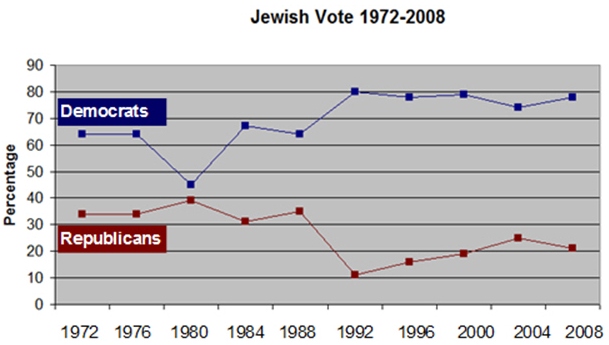With the coverage of the election season saturating nearly every media outlet, we cannot escape discussion of partisan politics.
Politicians from across the board are working long and hard to earn your vote. They’re assembling teams of image consultants, speechwriters, and advisers to effectively communicate with their specified targeted audience. Each candidate systematically tailors rhetoric towards particular segments of the voting populace to garner as much support as possible. Whether it is the so-called, “moderate vote” or “Evangelical vote,” candidates target specific voting blocs to assemble a unified patchwork of political support.

However, is there a “Jewish vote” anymore? In the age of globalization, intermarriage, and assimilation, can Jews still be considered a cohesive and similar-minded voting bloc?
According to previous voting history, Jews have traditionally voted for liberal or progressive candidates. In fact, a staggering 77% of registered Jewish voters voted for Barack Obama in 2008, according to Haaretz.
Are these statistics simply a representation of an amalgam of individuals that seem to agree politically? While one may be able to construe a feasible argument in support of seemingly united Jewish voting coalition based on the raw data, making sense of this wide ranging multiplicity of voices is anything but simple.

With the Obama Administration’s less than cozy relationship with Israel (compared to the Bush Administration’s de facto acceptance of all policy output from Israel), many are beginning to suggest fragmentation of the Jewish vote in 2012.
This begs the question of whether the Jewish state lies at the forefront of the Jewish voting agenda. With clear disparities in Birthright experience, religious and regional upbringing, and Jewish cultural exposure, the ideological spine of American Jewry does appear to be fragmented. These ideological divergences are as pronounced as the divides between JStreet and AIPAC, Monsey and Greenwich Village, Menachem and Brian.
All of these segments of Jewish society naturally possess varied social values and political beliefs. So, when a politician talks about shoring up the “Jewish vote,” what do they mean? Do Jews still present a unified political agenda – a singular united voice in the political arena, one kol? What are you thoughts?
My thoughts to follow.
Related articles
- Obama’s Biggest Jewish Donors are Turning on Him, Labeling Him a “SOCIOPATH” (colonel6.com)
- Jewish Votes, Some of Them in Play (nytimes.com)
- Israel policy may not move US Jewish vote – Sydney Morning Herald (news.google.com)
- Perry favored among right-wing jews (fedupwithnannyfed.com)
- Can GOP push for Jewish votes pay off? (cnn.com)


Great article! This question will be brought up again at J Street U at UCLA’s screening of “Between Two Worlds” on November 9th.
Also, I do not view AIPAC and J Street as divided as you make them out to be. Over the last 40 years AIPAC has done (and is doing) very important work on behalf of the American-Israeli relationship and, even though I spend most of my energy supporting J Street, I wouldn’t discount AIPAC’s importance for a second. I view the two organizations as two different branches of the same pro-Israel tree.
“With the Obama Administration’s less than cozy relationship with Israel (compared to the Bush Administration’s de facto acceptance of all policy output from Israel), many are beginning to suggest fragmentation of the Jewish vote in 2012.”
I find this very amusing as an Israeli. Bush was never as good as people make him seem towards Israeland there was never such a de facto acceptence of all policy output from Israel. If we remember it was the Bush administration that first introduced the “road map” and forced Israel to accept Hamas as one of the parties running for Palestinian elections in 2006. Not only that, it was also the Bush administration that forged the UN resolution 1701 after the Second Lebanon war in 2006. in which Israel was forced to rely on UN “peace keepers” to safeguard its northern border and Hezbollah was given free rang to do what ever they please. All these went against Israeli national interest and Israel was not given a “de facto acceptance” on these policy matters.
I also don’t see the Jewish political devide between Jstreet, which is far left, and AIPAC that is dead center on all that is Israel. AIPAC works with both the Republican and Democratic Parties while Jstreet keeps its influence safe in the hands of the Democrats. Maybe the Jewish Republican movement should your pull from the right? Although I don’t believe they have anywhere near the influence or are as extreme as Jstreet is from the opposite end.
Over all I think you can create a great debate over this issue and it will be very interesting to see what happens in 2012.